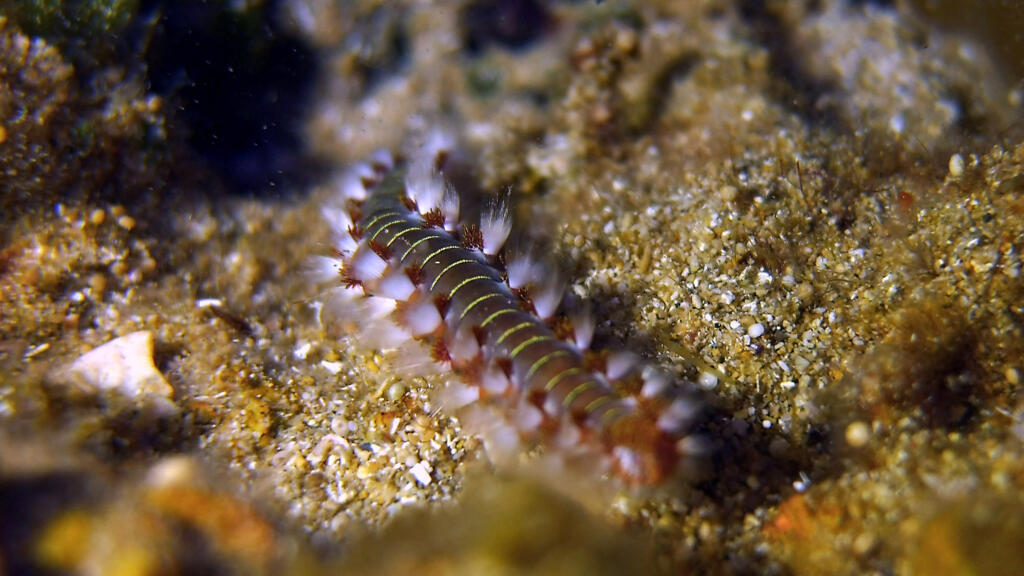
Warming seas are accelerating the spread of invasive species that threaten marine life and fisheries, especially in the Mediterranean, the European Union’s Copernicus Marine Service warned on Tuesday.
From May 2022 to early 2023, the Mediterranean went through its longest marine heatwave in four decades, with surface temperatures up to 4.3C above normal.
Scientists examined how that extreme heat affected two invasive species – the Atlantic blue crab and the bearded fireworm – which have spread in the Po River delta in northern Italy and along the Sicilian coast.
In the Po delta, the surge in blue crabs, which feed on shellfish, caused mussel production to collapse by 75 to 100 percent in some lagoons in 2023. The fast-breeding predator appears to have been boosted by warmer waters, threatening seafloor habitats and upsetting the balance of the ecosystem.
The bearded fireworm, a native Mediterranean species that can grow up to 70 centimetres long and live for nine years, also multiplied as the sea warmed.
Its venomous bristles have become a serious problem for small-scale fishers in Sicily, consuming bait, breaking secondary lines attached to hooks and damaging fish, which reduces their market value.
Brittany's mussel farms ravaged by surging spider crab invasion
Local fishers impacted
“This worm constitutes a threat both to marine biodiversity and to the economic stability of local fisheries,” the report’s authors said. They called for management strategies to curb its spread.
Proposed responses include encouraging local consumption of the blue crab, limiting the release of egg-bearing females and using the fireworm to process shellfish waste.
Beyond invasive species, the 2025 Copernicus Marine report warns that oceans face multiple other pressures – including rising acidification, growing plastic pollution and shrinking sea ice.
“Every part of the ocean is affected by the triple planetary crisis: climate change, biodiversity loss and pollution,” said Pierre Bahurel, director-general of Mercator Ocean International, which runs Copernicus Marine, during an online briefing.
The report said the ocean has absorbed about 90 percent of the excess heat from human activity since the 1960s. Sea-surface temperatures have hit record highs in many regions in recent years, fuelling more frequent and intense marine heatwaves.
Indigenous knowledge steers new protections for the high seas
Warming and acidification
Ocean acidification is also worsening as carbon dioxide builds up in the atmosphere. “As long as net carbon dioxide emissions are not brought back to zero, ocean acidity will continue to grow,” said Jean-Pierre Gattuso, research director at France’s National Centre for Scientific Research and a senior scientist at the Institute for Sustainable Development and International Relations.
Climate-driven shifts are also affecting other species such as micronecton – small fish, crustaceans and squid that rise to the surface at night to feed on plankton.
With the ocean warming, “cold ecosystems are shrinking and the habitats of Arctic and sub-Arctic micronecton species with them”, said Patrick Lehodey, a modelling expert at Mercator.
That shift has knock-on effects for predators from whales and penguins to commercially valuable fish.
Europe’s climate progress overshadowed by worsening loss of nature
The report said these changes show that the effects of warming are reaching deep into food chains and affecting both wildlife and human livelihoods.
More than 70 scientists from nine countries contributed to the report.
“The science is unequivocal: the ocean is changing fast, with extreme records and worsening impacts. We know why. This knowledge is not just a warning signal, it is a roadmap to restore balance between humanity and the ocean,” Mercator resaercher Karina von Schuckmann told the briefing.
The speed of the changes, scientists warn, is unprecedented in human history.
“These changes are happening very rapidly on the scale of two centuries,” Gattuso said. In contrast, the five mass extinctions in Earth’s history unfolded over thousands of years or more.







